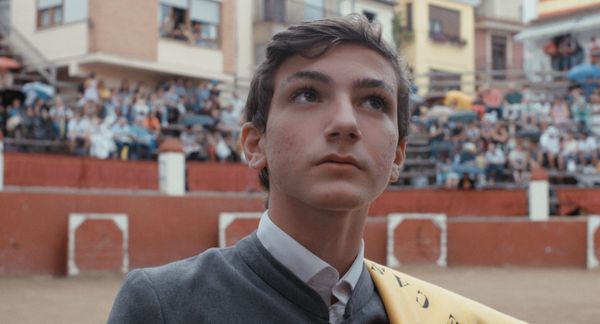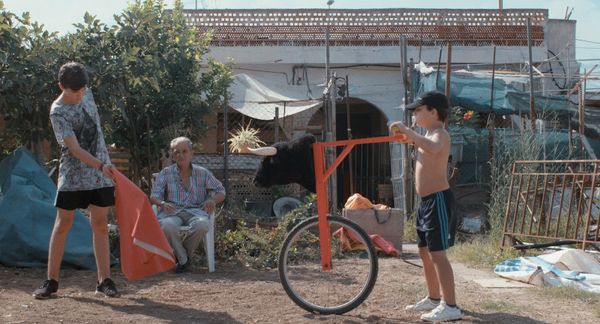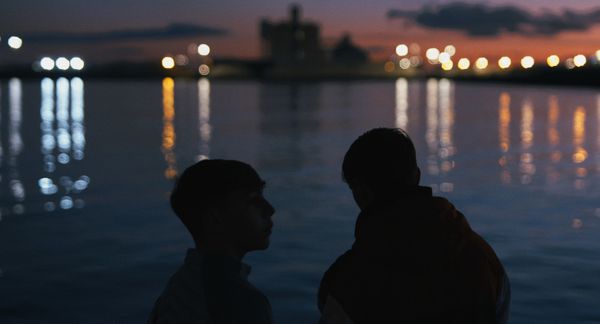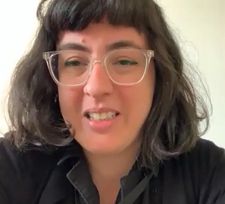 |
| Borja in The Boy And The Suit Of Lights. Inma de Reyes: 'I wanted to shape the style of the film around him and just kind of see the world through his eyes' |
Inma de Reyes’ The Boy And The Suit Of Lights (El Niño Y El Traje De Luces) is having its world premiere in the International First Feature Competition at Sheffield DocFest. The Edinburgh-based Spanish filmmaker takes an observational approach as she follows pre-teen Borja and his younger brother Erik in the Spanish town of Castellon, where she herself grew up. As Borja is groomed by his family with a view to realising his grandad’s bullfighting dream. The aspiration comes loaded with potential, in terms of being a way to help Borja’s family have a better life. But it’s not hard to see there are tensions between Borja’s quiet personality and the expectations that are being placed upon him. Borja was previously the subject of de Reyes’ graduation short film To Be A Torrero and she followed him for six years in total.
Tell us a bit about the expansion of your feature from your short
IdR The short film also premiered in Sheffield and I had been in conversation with producer Aimara Reques from Aconite Productions. She was at the screening with her company and another production company, Rustic Canyon, was also there. I had already started a conversation and pitched the idea of a feature. So, after the Q&A, we met and decided that we were going to work together and move forward as a feature, taking the short film as the beginning of his story.
I see from the director’s note that when you were growing up in Castellon, you weren't really aware of the bullfighting tradition there, that it claimed to be Spain’s “bullfighting capital”. Why do you think that passed you by? Is it a class system thing that's coming into play or something else?
IdR: I think more than class, it’s generational. My grandad was kind of into it, like he had gone to bullfights. My mum was never into it and my dad wasn't so I had never grown up with bullfighting, I'd never been to one or known anything about it.
 |
| Borja and Erik practise with their grandad in The Boy And The Suit Of Lights. Inma de Reyes: 'Erik, the younger brother, was constantly asking all the right questions' |
You decided to shoot this in an observational style for the most part although it seems you asked the grandad a few questions that he answered to camera. Why did you decide to take the observational approach with Borja?
IdR: Yeah, it was very interesting when I met Borja for the first time he wouldn't speak, he was a very shy child and introverted. So I wanted to shape the style of the film around him and just kind of see the world through his eyes. I didn't want to force him to say things that he didn't think or he didn't want to say. And I knew that even though he probably wasn't a good match for the profession he’d been given, he wouldn't say it out loud because that would upset too many people.
You can see through the film that he just wants to do what his family wants him to do. He wants to take them out of poverty and to be that person for them. And so from the beginning, I had to just shape the film around the quietness. And it's a very quiet film, very gentle and you don't see many protagonists in documentaries like that. But it was possible, I think, because Erik, the younger brother, was constantly asking all the right questions and being like the curious child and the active one, so that helped me a lot as well.
It’s such a lovely dynamic they have. You don't expressly talk about the family situation, but it feels like it's quite difficult sometimes for them. How did you persuade them to take part in the project, because not every family is going to want to be on camera, especially if they have some money worries.
IdR: Yes, it's true. It's very tricky because each person is different and you don't want to promise things to them, that may not happen. For me, it is always the case that I want people in the documentary to want to tell their stories, and not rely on me to gain anything else. I always want to bring something positive into the film, and it can be just conducted by money. Ethically, that’s also not correct and it would bring a different dynamic to the film. So, at the beginning, I feel like the mum was a bit like, “Okay, let's see how this goes”. So I made the short film and screened it, and they loved it.
 |
| Inma de Reyes: 'It's a very quiet film, very gentle and you don't see many protagonists in documentaries like that' |
They loved seeing themselves and said it was such a great memory to have. And then they love things themselves. They're a pet, like, it was such a great memory to have.So then I kept coming to my hometown to see my family and I’d also visit them. So I became really good friends with them and with the kids, especially, I love them. So then, over time, we built this trust and they were just happy to have us around. I would celebrate all their birthdays and bring cake and ice creams and go to the park, so it was fun. Whenever I felt like there was going to be an imposition or something I was very able to stand back.
So how would the shoot work. Were you following them for a few days periodically? I’m guessing that Covid might have interfered with things as well for a while.
IdR: It did for a while. We travelled for 10 days at a time, staying for a week, so travel, film and then come back. Obviously, we would agree this. When I was back home in Edinburgh I would write down what was next so it was kind of structured filming. For Covid, I think there was a year’s break. And then there was a summer [in between Covid waves] and then I came back for the last year, when he was 17.
It’s interesting watching children growing up on camera because they change so much physically and emotionally. Does that make it tricky from a filmmaking perspective because when a kid is 12 or 13 maybe they’re really keen to be on camera and it sounds like fun but as they get older they might not find it so cool.
 |
| Inma de Reyes: 'For me, it is always the case that I want people in the documentary to want to tell their stories' |
Were you ever worried that the shooting might just stop? And you might have to sort of make the film as far as you had got
IdR: Not really, no, because we had a nice relationship, and they always knew that we had to get somewhere.We got to a point where that was it. Everyone was, you know, in a sense, not happy but content. And I guess that's just the way things go. Sometimes, you just accept fate.Obviously, we knew that he was going to make it or not make it so there was going to be a point where we stopped filming. But they were always very engaged with the idea of having a natural ending. And I’m glad we got there.
It’s a case of growing up really and moving on to the next stage of life
IdR: I liked the idea of having it as a cycle. Because when you talk about poverty or privilege, it's always a matter of ending the cycle of a generation or a family that's constantly being deprived of opportunities.We thought that Borja was actually going to break the cycle or he was not going to break it and it was going to go down to Erik. He says to Erik, what you want to do now is football. He wants him to do well, to succeed? And for me, I was like, we could make the same film again, with football and with Erik.
IdR: Looking towards your future as well. I mean, you know, you've made a documentary, Isabel’s Independence, about being Spanish in Scotland and now this one has seen you head back to your hometown. What’s next
So the next one is in Scotland but I will obviously still acknowledge where I come from. The fact that I will always be a foreigner, even though I come home now to Edinburgh. I want to explore Scotland and how I fit into it now, that will be my next move.





















